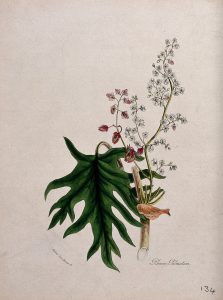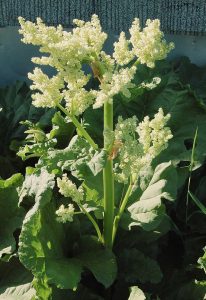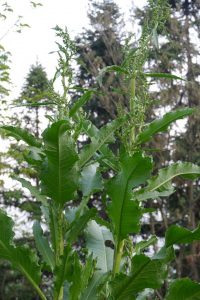In the year 545 emperor Liang Wudi came down with a severe fever. He suffered a lot from it and could neither eat nor sleep. He summoned all his physicians, each of them eager to combine herbs into a suitable prescription. However the emperor had studied a tiny bit of medicine himself and was very egocentric. He looked at the prescription of his physicians, disagreed and claimed that he wanted to ingest Da Huang [Rheum palmatum], in order to clear Heat. After Yao Sengyuan had taken his pulse carefully and differentiated his diagnostic pattern, he insistently told him:
“Your Royal Highness has already reached the honorable age of eighty years, the Zang-Organs and the Fu-Viscera are already in a state of deficiency and vacuity. As a fact there is accumulated Heat, yet under the given circumstances one must not purge it with such a harsh substance, otherwise the regular Qi could be harmed and impaired.”

However the emperor could not be convinced. Yao Sengyuan thereafter tried to persuade the emperor by citing Tao Hongjing, the great doctor of the Yuan-dynasty, who pointed out:
“Da Huang [Rheum palmatum], is the general. To use it is as if riding on a galloping horse.”
Yao Sengyuan cautioned the emperor to use milder remedies. But the emperor could not let go of his idea and ordered all the other physicians to leave his chamber and subsequently took Da Huang [Rheum palmatum],. The following night Yao Sengyuan was called upon by the emperor. After he had ingested Da Huang [Rheum palmatum], not only did the fever fail to abate, but his consciousness became clouded and he had to endure shortness of breath and palpitations. Thereupon Yao Sengyuan decided to employ the warming-harmonising method and prescribe neutral, mildly-supplementing herbs to the emperor, with the intention to restrain the Yang-Qi, which had been damaged by the bitter-cold Da Huang [Rheum palmatum], root. Only after several decoctions did the emperor slowly recover and convalesce.
Years later, after the death of the emperor, Yao Sengyuan also served Liang Wudi’ successor Liang Yuandi. When the new emperor suffered from stomach aches with nausea, hardening of the abdomen and lack of appetite, he assembled all court physicians, in order to prescribe a remedy for the emperor. The other court physicians were too fearful and concerned, since the last emperor’s health condition did aggravate drastically after he was administered Da Huang [Rheum palmatum], and thus designed neutral and harmonizing prescriptions. However Yao Sengyuan criticized them sharply:

“The pulse is flooding, large and strong. Apart from that he dislikes eating food and manifests with nausea and hardening of the abdomen. This denotes stagnation of undigested nutrients in the abdomen, whereupon the prescription is inseparable from Da Huang [Rheum palmatum].. The old has to be expelled in order to make way for the new. “
Emperor Liang Yuandi followed Yao Sengyuan’s advice and as a matter of fact he excreted large quantities of undigested food residue. Thereafter his complaint completely disappeared.

If you enjoyed reading this please consider supporting us!
When we started the Purple Cloud Institute, our aim was to make accessible educational material about traditional Chinese cultural practices. We strive to keep prices of our books as affordable as possible and the content we provide free of charge. However, there are many ongoing behind the scenes costs and the time taken to provide such content is considerable.
If you have enjoyed our offerings please consider donating and supporting us. The help will allow us to make time to bring you more in the way of book publications, podcasts and videos about tradition-based Daoist, Chinese medicine and martial arts and help keep these traditions alive.
Your assistance is greatly appreciated!
